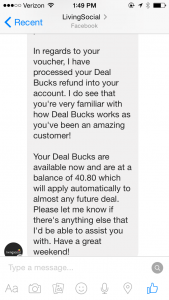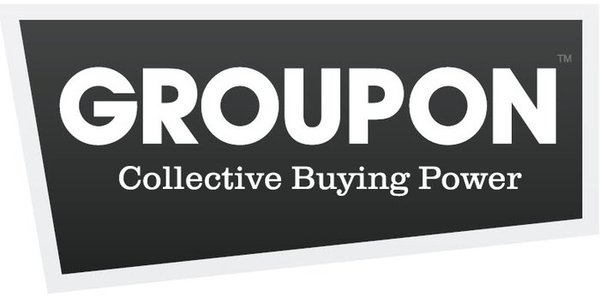Part One of a Series
Everyone likes to save money, and some of us are better at spending it than others.
Whatever your situation, by now you must have heard about online or app-based deal sites that allow you to purchase things at a discounted rate, then take your voucher to the store and redeem it for goods or services. Here in New York – and more specifically, in south Queens – there are plenty of deals to be had via this method.
In 2008, Andrew Mason came up with the concept: group + coupon = Groupon. Basically, if, say, a restaurant wanted to offer a prix fixe meal for half of its normal cost to a limited number of customers between September and December, his deal site, Groupon, would purchase those meals for approximately half of the sale price and then offer them (for a limited time) to its customers to snatch up before the Groupon clock ticks down. The restaurant, in this scenario, makes a quarter of what it normally would, but the special sale (which Groupon promotes) brings new customers in the door and rakes in reviews through normal media outlets, Yelp, and on Groupon itself. In addition, nothing prohibits a Groupon customer from purchasing additional food on top of the voucher offer. Therefore, if a couple brings their child and purchases him a kid’s meal, that additional purchase gets added to the check. Maybe the drinks that come with the meal aren’t enough, and they add on a bottle of wine. More money for the restaurant. Tips (and usually, tax) should be assessed on the voucher’s pre-discounted value, not on the actual cost.
The customer ostensibly gets a nice meal for half of what it would normally cost. Groupon makes money by acting as a liaison. Here is where customer service is absolutely key. If the customer has a bad meal or is treated inappropriately in the restaurant, Groupon must in most cases negotiate an appropriate solution.
Today the Chicago-based Groupon is in over 45 countries with a reported 2014 revenue of nearly $3.2 billion, offering discounts on everything from foreign getaways to botox injections. The name Groupon has become synonymous with savings, and, at least while Mason was still CEO, with the style of humor that Groupon infuses into a lot of the writing on the site. (A recent deal for all-you-can-eat sushi includes this nugget in its deal’s description: “In the past, farmers simply plucked naturally grown algae from the sea, cleaned off all the mermaid hairs, and dried it into nori.” The “mermaid hair” reference is subtle in what is otherwise a fact-filled description of how sushi is made. When you purchase a voucher, you often get this message: “Congrats on your shiny new Groupon! Thanks for your purchase! Like a timid ghost or a 1997 text message, your Groupon may take a few minutes to appear, but we’ll email you as soon as it’s ready.”) The creativity behind Groupon – from the initial concept to the jokester writing – is unmatched by any other online shopping site that this writer has visited.

LivingSocial’s customer service is unparalleled. Here is an actual exchange from a Facebook message with the deal site. LivingSocial prefers to handle customer service inquiries via social media. Forum Photo by Eugénie Bisulco
That being said, LivingSocial, Groupon’s main competitor – around since 2011 – is giving the company a run for its money in other areas. While LivingSocial’s site promotes a similar product, it has fewer deals, giving it a selective feel, is less gimmicky, and seems to concern itself more with figuring out how to make the customer happy.
“Our customers are always looking to try new adventures and unique activities – whether it’s planned weeks in advance or is spontaneous,” said Christie Ly, LivingSocial’s Senior Manager of Communications.
With a focus on selling an “experience” rather than a bargain, LivingSocial has made leaps and bounds in setting itself apart from Groupon – a larger company that, as it gets bigger, emphasizes the deal more than the customer. In Groupon’s earlier days, emails to support@groupon.com were responded to quickly, and personal attention was made to an individual’s customer service needs. These days it’s difficult to get a response within a couple of days, and often those responses ignore the actual problem. LivingSocial, on the other hand, responds to Facebook messages within a couple of hours. And it’s a company that still apparently believes that the customer is always right. When Groupon returns your money, it is often with reluctance or a belittling tone.
A recent inquiry into a package that was never delivered yielded, after many exchanges, the following response: ‘‘… according to your tracking number, it appears the product was delivered. I would recommend checking with your neighbors or others who might have accepted the package on your behalf to see if one of them has it. If you’re unable to locate the package, you can try contacting the shipping service, in this case USPS, to see if they can provide you with a signature confirmation or more specifics regarding where the item was delivered. They may be able to help you track down the delivery, or provide another solution.” In other words, Groupon wanted its customer to go door to door in search of the product it had sold, rather than simply issue a refund of $30 (even in Groupon credit) for the item. Conversely, there are 13 possible reasons on the drop-down menu on LivingSocial’s “request a refund” tab, the last one being simply “buyer’s remorse.”
In 2012, Amazon decided to join the fray after giving money to fund LivingSocial.

Olga’s Unisex Salon & Nail Spa in Rego Park currently offers a mani/pedi package on Amazon Local for $24. For three dollars more, the same package at the same salon (minus a foot massage) is offered on Groupon. Photo Courtesy of Amazon Local
Their site, Amazon Local, offers many of the same deals offered by Groupon and LivingSocial, at similar prices. But did you even know it existed? One Ozone Park couple, both longtime Amazon.com customers with separate accounts and spending histories, reported that Amazon Local had offered one of them discounts to get started with the new subset. The other, however, who even maintains an Amazon credit card, heard not a peep from the company about Amazon Local and didn’t even know it existed until her husband took her to a restaurant in Brooklyn with an AL voucher. A quick visit to Amazon Local’s site reveals enticing sample deals in Queens: A gyro meal for two in Forest Hills for $11 and a gel manicure, spa pedicure, and 10 minute foot massage for $24 in Rego Park.
For more information about specific deals (and reviews on local businesses offering them) from Groupon, LivingSocial, and Amazon Local, stay tuned to next week’s Forum.
By Eugénie Bisulco eugenie@theforumnewsgroup.com

